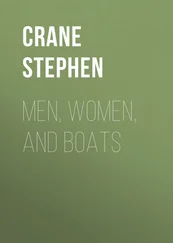But when she boarded the train having heard that Alexander might be in Pennsylvania or even seeking her and wondering where her elder New York friend was, she felt boxed in by these men east of her, west of her, while seeing that they all took her side. But the box was on the move and she knew that her dream of her lover had determined her to do what she was doing which was bring her stillborn child swaddled and sleeping in its mother’s dreams which were all it had, to Windrow to tell her faithful Alexander. And when she found the Hermit waiting for her in the smoke of the terminal and looked about lest Alexander be there, or, who knew? the Indian, she knew she would tell him her dream. But when he said to her Did she plan to go west again soon, her reason deserted her and she thought she could smell the package, which he reached for, and she cried, "I love him, he is my own true love," and the man said, "There, there." But later, when she told her dream, the act it had now determined her on seemed one answer to two or three needs: to be honest with Alexander, whatever it cost; to be faithful to the Indian, whatever he knew, so far as honoring the stillborn child; to obey her simple, not morbid need; and thus to hold some freedom that began to shape itself in her head as a taxi drew them gently to her friend’s house, among all these New York bicycles, and she knew she would be a good and firm mother.
We are waiting for it to come to us. We know it does. It was, like something to do, in us a long time back, where it ended to tell the truth; and thus transit angels not always out "thataway" to incorporate but inward to this other body of information so lovingly marginal we will let ourselves not know which we are, the margins or the core-core; yet we have found within us a pair of high workshoes given him — Who? asks the interrogator — by a doctor driving a one-horse shay who found them under the seat and they fit and the doctor confided that that coming Saturday he was remarrying (no wonder; he had been happy the first time); also a dark blue woolen shirt, held out to him by a fair-haired girl in a doorway holding a tiny red baby in her arm; an old, sun-singed straw hat with holes in it a short, bald holy man with a white, round collar gave him on a Sunday in front of a white mission built entirely of wood; a princely new pair of overalls donated by a fat young woman who found him asleep on her property and said he must be tired not to wake when she come along; a green-and-black-checked bandanna given him by an underwater swimmer, who came up out of a lake near Yonkers and offered him any clothes he wanted from the pile by a birch sapling. No one knew how he had come so far, but the Hermit-Inventor, who tried to comprehend his own responsibility here and what might happen, did not quite wonder how the Navajo Prince had come so far, not only because Navajos travel vast distances but because he had heard scientifically proved that things might appear at widely separate places with no apparent movement in between, and so why not people? and he had voiced it to Margaret when he had interpreted her dream for her a few days since. If the Prince detected anxiety in the Hermit looking fitfully out a begrimed glass window into a street full of yelling and horses clattering metal hooves like weapons on the stones of the street, and bicycles running in and out, each felt somewhat cared for by the other, and they spoke of the people here — some girls coiled their hair in squash blossoms each side (Yes, replied the Hermit, they are Jewish); and they spoke of the weather and of the late Anasazi whom the Hermit joked about affectionately and warily until the Prince said, "He is in Maine by now and I will join him there," which turned the Hermit from alarm over Margaret to alarmed fascination over this after all strange possibility, the single tie or question between these events, these consequences, these "event horizons!" in New Jersey and in Maine being this long-haired, long-fingered, diamond-eyed traveler so honest and so momentous that astounding strength in him had made him perhaps an answer not a question; but still they did not speak directly of Margaret. They spoke of seacoast and its limitlessly varied and mayhap variable outline north to south, of the east wind that may penetrate a thickly settled coastal area well inland whereas an inland wind from west has forests obstacling its progress and is deflected and dispersed, yet why should there not be forests that will take that force and use it as the Navajo barques coming across the sea kept on when reaching land and sailed the land as well? The young man stood by a window and asked what were the shapes upon the posts in front of the houses across the street, and his Anglo elder said they were pineapples, a fruit yellow and juicy on the inside, prickly on the outside, a sign of friendly welcome, of home, and nothing to do with pine trees. The young man said he would go to both places. Both? Yes, to Margaret’s town and then north. When the Hermit upon being asked with such directness of vision what Margaret’s dream had been and what it had meant, that he must answer (and having anyhow previously brought it up himself as if to put it between him and the incredible young Indian who had walked into New York and found the Hermit and on his way here inspected the new great arch not two years old) answered at length concluding that her dream had brought her home, for it was evidently of the Statue of Liberty, whose parts had been the occasion of their meeting almost nine years before on Bedloe’s Island and which had now been assembled (She had told him, she had told him, the young man answered, not of meeting the Hermit but of the Statue in the harbor, and she had laughed about it and said it was big but not very good, but he would have to make up his mind himself and maybe she would meet him there, too)— anyway it was there, said his Anglo elder, whose charts and instruments cluttered his home, that he had told her to go west and later on her way to Chicago she had seen him in New York and—
— and the Hermit-Inventor of New York had been the one, said his visitor, to tell her of those sojourns in the Southwest, the mesas and canyons, the washes and the great grasses, the crown around the moon caused by nectar from the cosmic ocean (I never told her that! said the host) and flower colors and the cliff colors and an old former healer who made predictions.
The Hermit told him his mother had been restored to life on his sudden departure, and the Prince retorted that a Zuhi outcast had told him long ago; and when the Hermit said the sooner he got up North the better, since the Anasazi would see what he had traveled to see and then would be no more, the Prince returned that he would go to both places, to find Margaret and to see the Anasazi in his cloud, for the Prince had within him a huge compacted dollop of that cloud’s light.
Yet when the Hermit did not believe him, he told him his mother had also not been believed when she told his father, her husband, of seeing a hunter on the mountain withered instantly to mere skull and clothes and of meeting a second hunter who sent her away down the mountain saying another flash hailstorm (though she had not seen the first) would come from the north sky-path and she and her child would be sucked away into the mountain, for she was very pregnant, and she had never been happy with her unbelieving husband after that. Never. And had become sick.
The Hermit-Inventor was so fascinated by this that, about to take it up (for he sensed some tie between the corridor of hail and a coastline intimation he had long had), he both half-forgot Margaret’s danger and simultaneously half-forgot his own discretion and, with wind-dispersion absorbing his mind plus that strange source of spiral winds due to shearings between cactus’s dry and a certain vegetarian reptile’s moist breath whence spiral winds faintly green due part to cactal skin part to the reptile’s prior incarnality as the dreaded Pressure Snake he now years later realized he had heard of first from Owl Woman who had known this young man’s mother, he blurted out, "Let her be; she’s home where she belongs; she’s got a good life with a young man who’s waited for her all this time; let her be —I’ll find the money to get you on a train back home yourself; let her be, let her be — I don’t know what I been thinking of, if you go back West you’ll serve yourself best" — but in the pressing silence that ensued, he found in the energy of his fear this fascination, and began again about hailstones from the northern corridor and their effect through apparently the blue Pressure Snake that Mena had said existed in other but like form along the extreme mountains of the South; but the Navajo Prince said simply, "My horse dwindled into death, and the train I took faded from what lived; life leaves death-things and that is what I will go to Windrow to show her."
Читать дальше












